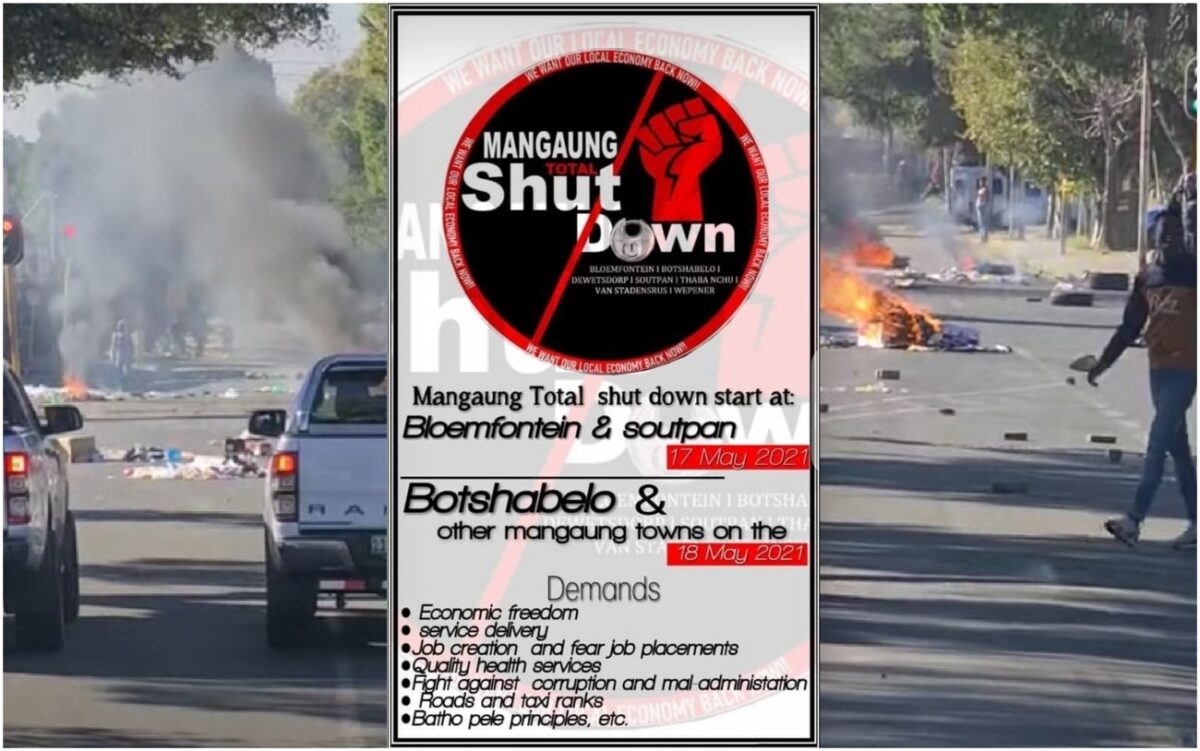Plumes of smoke hovered over Bloemfontein; it was to herald the start of mayhem in Manguang Metro. The corners of streets were piled up with litter, the air permeated with stench, raw sewerage flowing from broken pipes, and roads covered with potholes. In Heidedal, a suburb southeast to the city centre, women can be seen sweeping the streets in their area in an attempt to keep rats out.
While the province’s elders prepared to receive their long awaited Covid-19 jabs, the rest took to the streets to voice their dissatisfaction with service delivery.
Their demands were access to business and job opportunities, improved service delivery, quality health services, and an end to corruption and maladministration. While the outbreak of this protest may have come as a surprise to some, it was painfully predictable. The Auditor General’s report released on June 1, 2020, pointed towards this. This report painted a grim picture of municipal governance in the province as 50% of municipalities failed to account on how taxpayers’ money was spent for the 2018-2019 financial year.
To aggravate matters, the province had racked up R1.4 billion in irregular expenditure for the year under review. Manguang Metro has been under administration since 2019, following recommendations from National Treasury. The Free State leader of the Democratic Alliance, Roy Jankielsohn, states that municipalities in the province are close to collapse. Poor municipal governance is not unique to the Free State, but rather an emerging trend in the country.
In the North West province’s Boikhutso township in Litchtenburg the same can be observed. Service delivery in this town has come to a complete halt as ANC factions fight over control of the Ditsobotla local municipality. The local community took to the streets torching police vehicles and injuring law enforcement officials. On April 13, 2021, the Pretoria High Court ordered the national executive to take over the running of the Lekwa municipality in Mpumalanga following its inability to manage its own finances and provide public services. But, service delivery is not the whole story.
Astute political observers have noted that the Free State, North-West and Mpumulanga provinces have been governed by the leading members of the Radical Economic Transformation faction of the ANC erstwhile ruled by Ace Mageshule, Supra Mahumapelo and D.D. Mazuba. Whilst the latter has joined forces with Cyril’s ANC to become Deputy President, the former two Premiers stand with Zuma. The parties within these provinces remain divided as the battle for the soul of the ANC continues apace. The possibility of factional politics exacerbating genuine service delivery protests therefore cannot be discarded.
During his budget vote speech, Minister of Finance, Tito Mboweni highlighted the danger dysfunctional local authorities have to service delivery. Using this platform, he pointed out that economic recovery may not be possible for the country until incompetent administration and poor financial management is resolved. Political interference in administration, poor leadership and infighting remain a challenge. There has been no return on the billions spent over the years to capacitate municipalities, as 63 municipalities are currently in financial distress, 40 entangled in financial and service delivery crisis, and 102 with adopted budgets that they cannot finance.
As the country prepares for its’ sixth local government elections, one cannot help but wonder how the dysfunctionality of municipalities will affect voter registration and more importantly, voter turnout. Will the resumption of load-shedding, the worsening consumer financial pressure, intensified gender-based violence, the increased xenophobic and homophobic attacks, and social unrest push people towards the ballot box or would it result in them becoming more disheartened with the political process? Conventionally, politicians would continue their door-to-door campaigns and hold big rallies. During this time many promises would be made in an attempt to sway voters support. The outbreak of the Covid-19 pandemic makes this impossible.
So, how do they successfully campaign during this? How do they prevent elections from becoming a super-spreader event? Boldly put, little markers for people to stand on is not sufficient. While some may suggest remote voting methods such as online-platforms for voting and mail or postal voting, these may not be viable for South Africa given the logistical planning and infrastructure needed to make it possible. Questions were asked and some rose to the occasion. Virtual rallies was the answer. Some political parties have decided to embrace the notion of 4IR and reach out to their constituencies using online platforms, social media and even radio stations. Will it be enough to get people to the polls? An election is needed to prevent the legitimacy of the country being put into question and perhaps more importantly to restore the faith and trust of communities in government – both local and national.
Mr President, how do we safely go about it?

